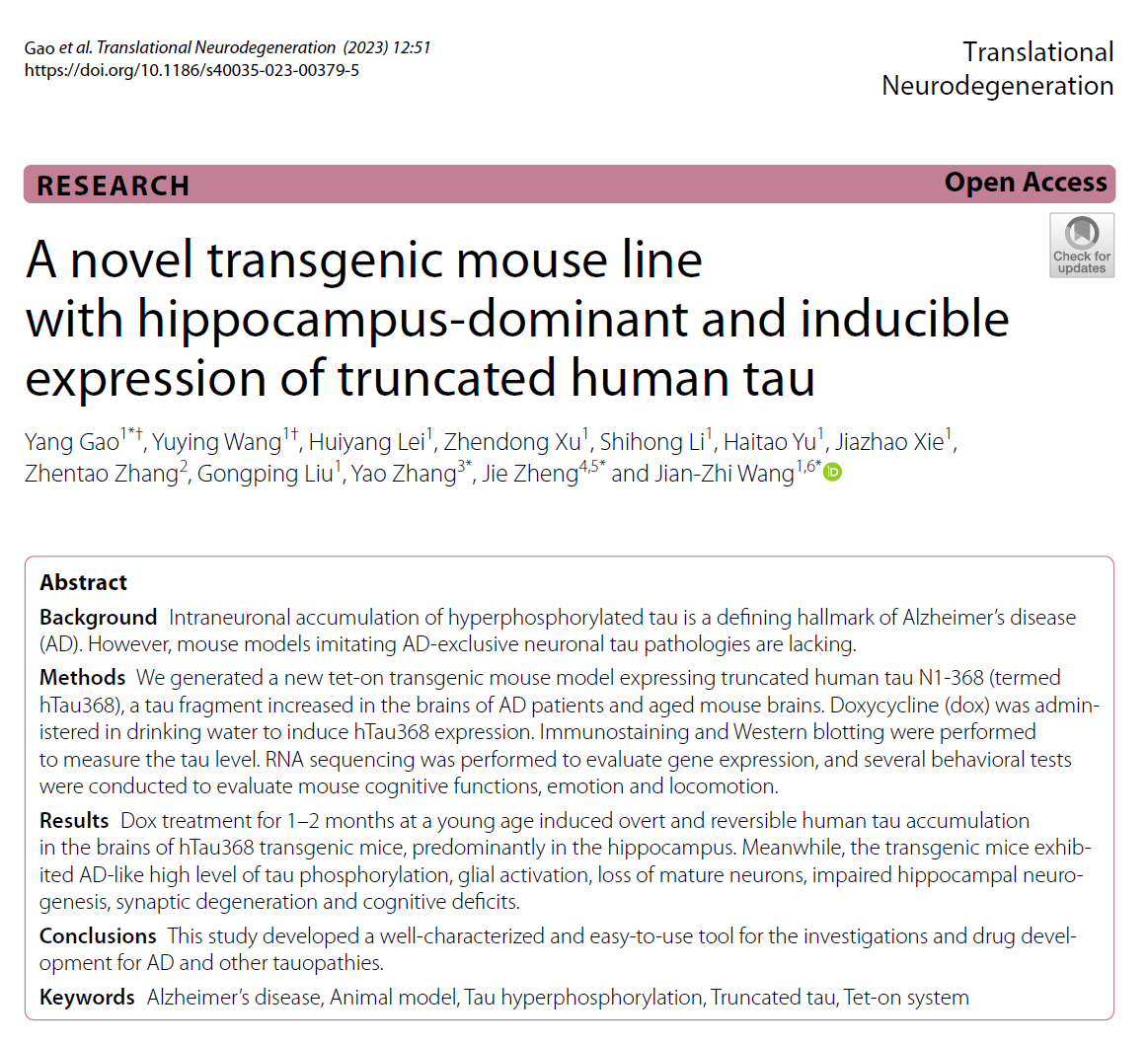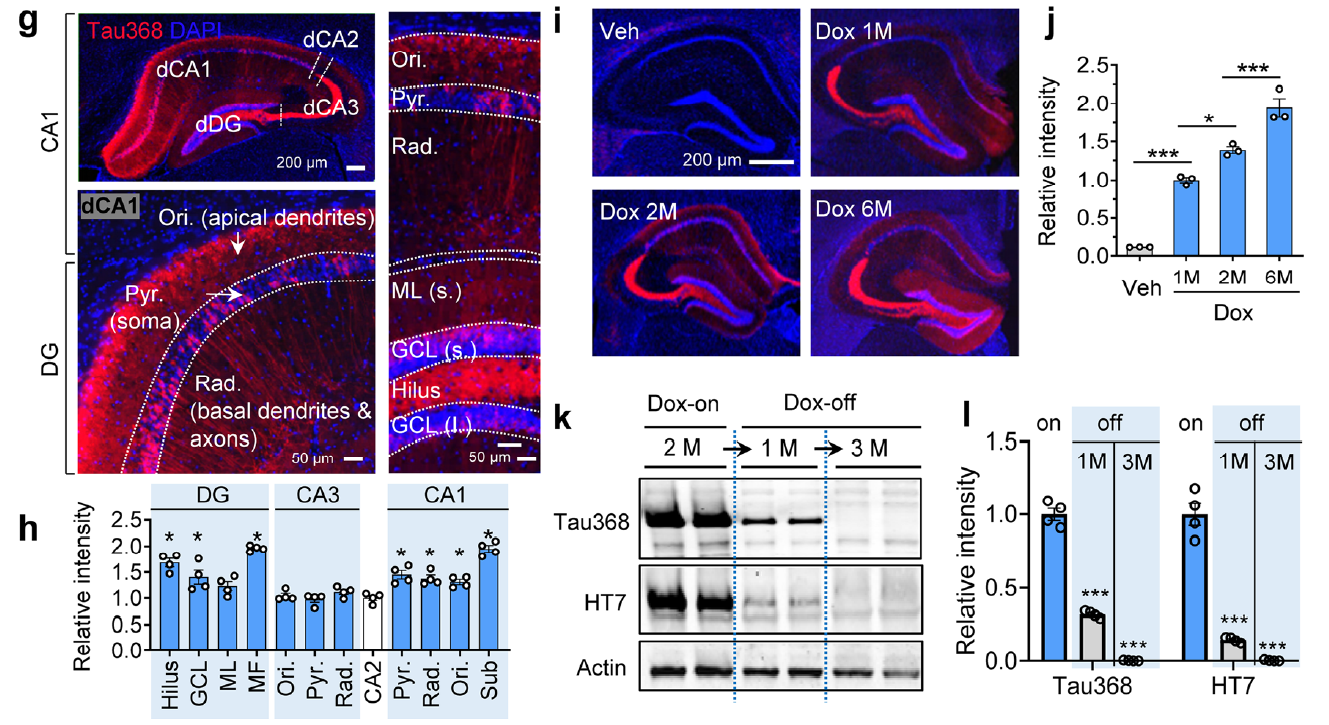AtaGenix Laboratories
AtaGenix Laboratories
Release time: 2025-10-14 View volume: 316
Alzheimer’s disease (AD) is the most common neurodegenerative disorder among the elderly, characterized by the abnormal accumulation of hyperphosphorylated tau protein within neurons, leading to the formation of neurofibrillary tangles (NFTs) and cognitive decline. Studies have shown that truncated tau fragments (e.g., N1-368) are significantly elevated in the brains of AD patients and aged mice, promoting the progression of tau pathology. To model AD-specific tau pathology, researchers developed a novel tet-on transgenic mouse model (hTau368) that inducibly expresses truncated human tau N1-368, resulting in hippocampal tau accumulation, phosphorylation, neuronal loss, and cognitive impairment.
Related research was published in Translational Neurodegeneration , DOI: 10.1186/s40035-023-00379-5.

The research team aimed to establish and characterize an accessible Alzheimer’s disease animal model, with specific requirements including:
1. Validating the reversible expression and distribution of hTau368 in the hippocampus;
2. Assessing tau phosphorylation, glial cell activation, synaptic degeneration, and cognitive function changes;
3. Investigating the impact of truncated tau on neuronal generation and AD-like pathology formation.
To achieve precise detection, the team required highly specific anti-tauN368 antibodies to accurately identify truncated tau fragments in Western blot (WB) and immunofluorescence (IF) experiments.
The anti-tauN368 antibody needed to exhibit exceptional specificity and stability to distinguish truncated tau from full-length tau while avoiding cross-reactivity. It also had to be compatible with multiple platforms (WB, IF, IHC) and minimize non-specific signal interference. For tau accumulation in different hippocampal subregions (CA1, DG), high-sensitivity immunodetection methods were required for quantitative analysis.
1. Antibody Development Strategy: AtaGenix used KLH-conjugated tau peptide (Cys-358DNITHVPGGGN368) as the immunogen, immunizing C57BL/6J mice, followed by hybridoma cell fusion and screening to produce monoclonal antibodies. The antibodies were purified using Protein A/G affinity chromatography, ensuring purity >95%.
2. Experimental Workflow: Through optimized immunization strategies and subcloning screening, highly specific anti-tauN368 monoclonal antibodies were developed with an ELISA titer >1:64,000, suitable for WB and IF experiments.
3. Validation Methods: The Odyssey imaging system and ImageJ software were used to analyze hTau368 expression and phosphorylation levels in the hippocampus, confirming the antibody’s specificity in detecting truncated tau aggregates. Combined with Morris water maze behavioral tests and electron microscopy, the antibody validated synaptic damage and cognitive deficits caused by truncated tau.
4. Additional Support: AtaGenix provided comprehensive antibody quality control reports (including SDS-PAGE purity, ELISA titer, and batch consistency data) and recommended optimal experimental conditions (e.g., WB dilution ratio of 1:1,000, IF staining conditions).
AtaGenix’s highly specific anti-tauN368 monoclonal antibody played a critical role in the hTau368 transgenic mouse study. The antibody validated dox-induced reversible tau accumulation and phosphorylation in the hippocampus, confirming that truncated tau triggered glial activation, neuronal loss, and cognitive deficits. The antibody’s high specificity and stability ensured reliable experimental results, aiding the team in elucidating the role of truncated tau in AD pathology and providing a new model and experimental basis for tau-targeted drug development.

hTau368 Expression in the Hippocampus
AtaGenix Laboratories is dedicated to providing high-quality protein and antibody customization, development, and functional validation services, empowering research teams to efficiently advance their projects. Learn more about our services, please visit: www.atagenix.com.
Contact Us
+86-27-87001869
info@atagenix.com
Building C, R & D Building, No. 666, Shendun 4th Road, Donghu New Technology Development Zone, Wuhan

